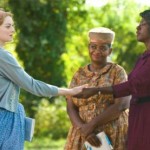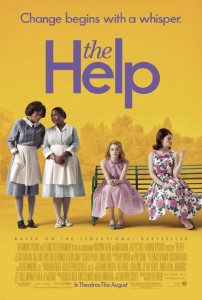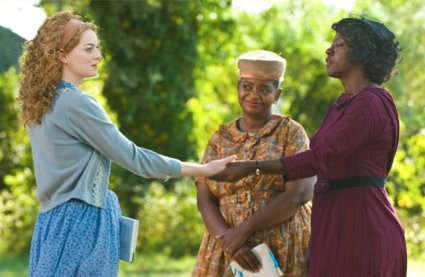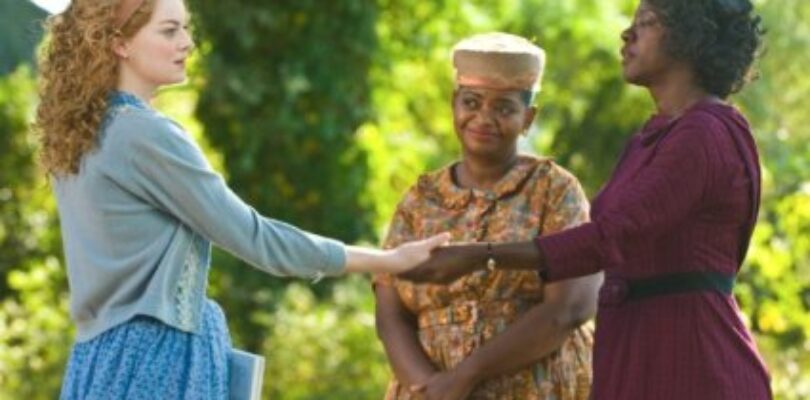
| Release Date: | August 10th, 2011 |
| Starring: | Viola Davis, Emma Stone, Bryce Dallas Howard, Octavia Spencer, Jessica Chastain, Ahna O’Reilly, Allison Janney, Sissy Spacek, Mike Vogel, Cicely Tyson |
| Writer: | Tate Taylor |
| MPAA Rating: | PG-13 |
| Director: | Tate Taylor |
I, as did many women in this country, read the book The Help, so the movie was on warning in my head to deliver the goods and stay true to Kathryn Stockett’s novel, or else. It did. And one of the reasons it succeeded is the fact that Stockett’s childhood friend (since the age of five) Tate Taylor serves as both writer and director of the new film adaptation. Taylor (a mostly unknown actor who had a small, but good, part in Winter’s Bone) is not quite “Hollywood,” and the fact that he grew up in Mississippi along with Stockett gave him some insight. He apparently bought the screen rights from his friend before the book was even published, which was a smart move.
 The story of The Help revolves around “Skeeter” (Emma Stone), a white recent college grad who aspires to be a writer, her friends, and the domestic help that all their families employ in the small, segregated town in Mississippi (based on Jackson, where Stockett and Taylor were raised) where they all live at the beginning of the tumultuous 1960s. Things are so bad in the town that not only do black citizens have to use separate bathrooms in public places, one of the characters (mean Hilly Holbrook, played with stoniness by Bryce Dallas Howard) starts a “health” campaign to encourage families to build their maids outside bathrooms, since the thought of them using the family bathroom is “unhygienic.” Skeeter (real name Eugenia) Phelan doesn’t agree with the treatment of the “help” and going against old pals like Hilly is going to change her life as she knows it.
The story of The Help revolves around “Skeeter” (Emma Stone), a white recent college grad who aspires to be a writer, her friends, and the domestic help that all their families employ in the small, segregated town in Mississippi (based on Jackson, where Stockett and Taylor were raised) where they all live at the beginning of the tumultuous 1960s. Things are so bad in the town that not only do black citizens have to use separate bathrooms in public places, one of the characters (mean Hilly Holbrook, played with stoniness by Bryce Dallas Howard) starts a “health” campaign to encourage families to build their maids outside bathrooms, since the thought of them using the family bathroom is “unhygienic.” Skeeter (real name Eugenia) Phelan doesn’t agree with the treatment of the “help” and going against old pals like Hilly is going to change her life as she knows it.
Trying to find something meaningful to write about besides the domestic column she contributes to the local newspaper, Skeeter decides to interview the maids about their experiences in white homes after she observes, with her writer’s eye, the relationships between the help and their employers: how they’re treated, how it feels to practically raise white children while their own are not with them during the day, how the children love the maids when they’re little but somehow grow up to be just like their parents, etc. She has a story of her own in this vein, as her maid Constantine (heartbreakingly played by Cicely Tyson), was with her family for 29 years and had a big hand in raising her before she was ousted from the family while Skeeter finished her senior year.
Abileen Clark (Viola Davis), maid to Skeeter’s friend Elizabeth (Ahna O’Reilly), is the first to agree to be interviewed. This is a big deal, because blacks and whites did not interact in this way and getting caught fraternizing with a white person could cause a lot of trouble for Abileen. Eventually, Skeeter is able to win over Abileen, her sassy friend Minny (Octavia Spencer), and in turn, many others and the book becomes a reality. Of course it has to be published anonymously to protect the maids but the point is made.
The movie does have one of the maids tell one “good white people” story about how she was treated well by a doctor she worked for, which is a relief. The stories are hard to hear, and the actions harder to watch. Judging by the audience reactions to some of the more appalling treatment (as if this were news to them), these stories need to continue to be told. But the movie certainly has a lot of humor (anyone who read the book will anticipate “the pie”) intertwined with all of the racial tension, so there is much joy to behold amidst the squirming. The movie does have quite a bit of light-hearted girl-fest spirit to it, but then it has deeper scenes as well. They really did a stunning job of recreating the murder and aftermath of Medgar Evers in 1963. Evers’ widow attended a special screening in Washington, DC and she endorsed the movie.
Besides using a fellow Mississippian to direct, the movie stayed true to the book with its spot on casting. Current “it girl” Stone does fine playing Skeeter; even if she isn’t quite the gangly girl we who read the book may have envisioned (she’s just not tall enough to have the physical awkwardness that was so prevalent to the character in the novel). She nails the smart, awkward, and hopeful young girl who is itchy to get out of the repressed southern town and spread her wings, but she still wants to find love. Davis as Abileen is the moral center to this movie. The book switches between the narrative voices of Skeeter, Aibileen, and Minny, but the movie only has Davis doing narration, and that’s probably a good thing. If you have Viola Davis, utilize her. Looking physically transformed (as always), her character has had quite the life: she loses a biological son, but also loses many white children she considers her own (despite how awful their parents may be) when they grow up. Davis is one of the better actresses working today, and I for one am glad that she didn’t shy away from this important part simply because she’d be playing a maid. Octavia Spencer, with those big eyes, sparkles as Minny, Abileen’s “sassy” best friend. Taylor reportedly had to fight to cast her, the only actress he ever considered for the role, as she wasn’t famous enough. She will be now. She gets all the fun parts – the ones that make you laugh and the ones that make you want to cheer, while Davis’ are less flashy, but she does have a moment where she lets go. But Spencer has her softer moments as well. The chemistry and relationship she has with her flighty employer Celia (Jessica Chastain), an outsider (considered “white trash” by the other girls in town because she married Johnny (Mike Vogel), Hilly’s ex, because she got pregnant) is terrific. Chastain is excellent as Celia, bubbly with the anticipation and desire to fit in, but crumbling from tragedy. Allison Janney is good as Skeeter’s mother, a woman who, though she has cancer, is still so concerned about how things look. Sissy Spacek makes the most of her role as mean girl Hilly’s mom, whom Hilly treats as badly as everyone else. Audiences will also cheer for the spunk she brings to her character. True Blood fans need to look for a small appearance from one of that show’s cast members (I won’t give it away, but it’s great to see him).

Emma Stone (from left), Octavia Spencer, and Viola Davis in The Help. Photo by Dale Robinette – © DreamWorks II Distribution Co., LLC. All Rights Reserved.
The Help, both the book and so the movie as its companion will be, is either beloved or hated by those who encounter it. Some think Stockett had quite the nerve, as a white woman, to write this story in the first place (though she had one such maid growing up that she was very close to, as did writer/director Taylor, who cast his, Carol Lee, in a small part in the movie). Others tire of seeing black women on screen in stereotypical roles of domestic workers all the time. And I get that. But in interviews, Davis and Spencer have lauded the movie as giving women real roles to sink their teeth into, which is too rare in Hollywood. Davis has said that she’s “played lawyers and doctors who are less explored and more of an archetype than these maids.”
The movie (and the book, really) is more than just a story about white people doing black people wrong. At its heart, The Help is movie about women, what they went through no matter their color, and the bonds of friendship and knowing when to ditch one when it is just wrong (and when to open your heart to one that you never thought would happen). In Skeeter’s case, she was born into a society family in Mississippi who had one goal for her: to marry well. Going to the storied “Ole Miss” was not to get an education, but to obtain the MRS Degree. One of the funniest lines in the movie is when one of Skeeter’s old friends comments on how they’ve missed her – that she’d been gone for “so long” and Skeeter reminds her that it does take four years to get through college when taking the academic route. As for the black women who are reared in this area, they pretty much know their destinies too: working as domestic help for less than a fair wage and having to keep their mouths shut to stay employed. The movie’s agenda is not to shove a history lesson down your throat, or to try to make a statement as to which group of women had it worse (you can’t even compare, of course) but to show what was. And it succeeds. The Help also happens to be highly entertaining and a celebration of humanity – good and bad.[box_info]WHERE TO WATCH (powered by JustWatch)
[/box_info]


Harlepas
It is funny how much you like this book. In a historical sense, the book is filled with inaccuracies about the condition of the black women. It pays little attention to the destructive natural of Jim Crow laws and glosses over everything of real merit so it can paint a picture that is rosy and sunny. You smiley face endorsement of such a ridiculous story does you a great disservice. I suggest picking up a history book and begin a process of understanding the true realities of being black in the south. By the way, I am white and I am betting you are too.
Lauriefun8
Did you read the book? It is certainly not rosey and sunny. And have you seen the movie? Same deal. And Hollywood is not exactly known for historial accuracy. If you want that, don’t read a novel or watch a movie.
Mike D
First of all, have you ever heard of spell-check? Your grammar is atrocious. Secondly, this is a Fiction book so why do historical inaccuracies bother you so much that she liked the book?
Your tone is rude and your comments are unproductive. Fiction = interpretation. If you want historical accuracy then YOU should read a history book. What makes the story so ridiculous? How does a smiley faced endorsement equate to a disservice? Who cares if you are white and what relevance does it have if the author is?
Mhaniff2003
Is this book not a work of *fiction*? Although Stockett indicates that the story was inspired by her own experience, it in no way attempts to masquerade as a comprehensive, unbiased account of race relations in the South at the time. I truly enjoyed reading The Help, but then again, I approached it as a work of fiction. I have yet to see the movie, but if this review is accurate, I’m sure I will enjoy it just as much as the book. :0)
Mike D
“Judging by the audience reactions to some of the more appalling treatment (as if this were news to them)” <——–You could at least use my name if you are going to mention me in your review lady 🙂 And it wasn't news to me, just very uncomfortable to watch people being so poorly treated.
Seinfeldted
Please check out this GREAT video on fashion in “The Help” TODAYS LOOK – http://andrewmukamal.com/todayslook/todays-look-episode-37-fashion-in-film-the-help
pgtipsonfilms
Interesting review, and you make some good points Laurie. Have a read at my review,
http://pgtipsonfilms.com/2011/11/08/the-help-review/What do you think?